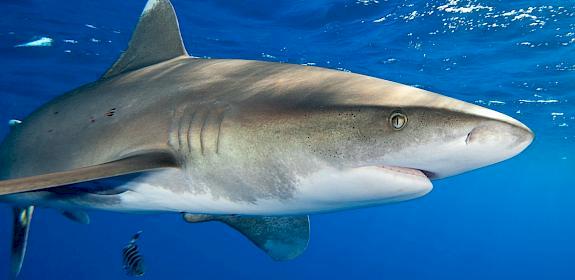Future of Yellowfin Tuna hangs in the balance
La Reunion, France, May 2016—A critical meeting of the Indian Ocean Tuna Commission (IOTC) takes place next week in La Reunion, where more than 30 Member States discuss whether to adopt conservation measures that will improve the management of their shared tuna stocks.

The IOTC is one of the Regional Fisheries Management Organizations (RFMOs), which manage fishing on the high seas—waters outside of any national jurisdiction.
Of particular concern is the Indian Ocean’s Yellowfin Tuna population, whose status was changed last year from green to red by the IOTC’s Scientific Committee, which also warned of a possible stock collapse if fishing continues at recent high levels.
“This is an opportunity for the IOTC to lead the way in conserving one of its highest profile species and put measures in place to stop the overfishing and start to rebuild the depleted stocks,” said Glenn Sant, TRAFFIC’s Fisheries Programme Leader.
“Adequate conservation measures put in place now may mean short-term pain, but it’s for long-term gain—it’s in every responsible fishing nation’s interests to adopt them.”
The meeting also provides an opportunity for IOTC Member States to put monitoring measures in place that can trigger an early response to signs of changes in fish stocks and thus head off the need for drastic measures after the damage has already been done.
“As the saying goes, ‘a stitch in time saves nine’ and nowhere is this truer than responsible fisheries management practices,” said Dr Wetjens Dimmlich, WWF’s Indian Ocean Tuna Programme Manager.
“And there are positive signs—increasingly we are seeing support from broad sectors of the fishing industry who understand that without healthy stocks of tuna, their business will suffer.
“IOTC Member States should put their differences aside and work towards ensuring that their mutual dependence on a shared tuna resource for the livelihoods of their communities and industries is not threatened through a continued lack of effective fisheries management.”
The Yellowfin Tuna is not the only species with an uncertain future: the region’s shark and ray populations are also at serious risk from over-fishing and a number of important measures are on the table during the IOTC meeting that would help protect them.
Among them is a proposal making it a requirement for sharks caught in IOTC waters to be landed with their fins naturally attached—this would enable the species caught to be identified and accurate data compiled on the numbers caught, a vital pre-requisite for fisheries management.
Equally important is for IOTC Member States who have imposed shark fishing bans to continue to report any ongoing mortalities that occur.
It’s a question of responsible reporting—the more accurate the information, the easier it is to manage fisheries sustainably
Glenn Sant, TRAFFIC’s Fisheries Programme LeaderThe meeting also provides an opportunity to build support with the Convention on Migratory Species, through the signing of a Memorandum of Understanding on shark conservation. In addition, delegates should take action to support IOTC Member States in the implementation of the shark and ray species currently listed in the Convention on International Trade in Endangered Species of Wild Fauna and Flora (CITES). Under the rules of this Convention, countries need to prove the harvest of these species is sustainable and legal before they can issue permits that allow for their trade.
“Everyone needs to work together to secure a brighter future for the fisheries in the Indian Ocean and those who rely upon them for their livelihoods,” said Sant.




